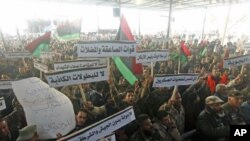Libya is offering a cautionary tale to the Arab uprisings of the past year, with regional divisions and independent militias challenging the hopes of a democratic post-Gadhafi state.
In the year since the opposition to the late Moammar Gadhafi rose out of Libya's long-seething east, the leaders of the uprising have struggled to address some of the underlying causes and the fallout of the rebellion.
The National Transitional Council (NTC), now sitting in Tripoli in the west, is trying to rein in autonomous militias, rebuild a nation that suffered not only months of civil war, but decades of erratic rule. And most recently, the NTC is trying to counter a challenge from the region where the council was born.
The announcement earlier this month that civic leaders in the eastern Brega region want to form an autonomous federal region prompted quick denunciations from NTC officials as an attempt to split the country.
Paul Salem, director of the Carnegie Middle East Center, said the Brega declaration is significant, if “not completely surprising.”
“The eastern province, mainly Benghazi and the regions of the east, have felt that they have always been underrepresented, that under the Gadhafi regime, Tripoli and the west were taking all the advantages. And they are now fearing the transitional council and the new government is also very much based in Tripoli and giving Tripoli a very major role,” said Salem.
That weight toward western Libya will become more apparent with assembly elections in June, with the more densely populated Tripoli region having greater representation in a body designed to write the nation's new constitution.
Some observers see the declaration of eastern federalism, along the lines of the pre-Gadhafi monarchy, as a bid to make sure that the oil-rich east is not overlooked in the process.
Underscoring the point, the Brega leaders have denied any desire to break away from Libya completely.
But the situation is complicated by the weakness of the NTC, which has failed to establish firm control in much of the country and has yet to bring the numerous regional militias under a unified command, exacerbating regional divides.
According to Ziad Akl, a political analyst at the Cairo-based Ahram Center for Strategic Studies, the NTC has made a good faith effort in offering militia members a place in the security forces. But he argues now it must threaten consequences for those who fail to join the national cause.
“Only when there is a law that punishes those who do not comply to it based on the legitimacy of the law and the legitimacy of the application of this law, only then when the militias in Libya come to an end,” said Akl.
Neither Akl nor Salem see the current situation as necessarily heralding further conflict or a return to civil war.
Rather, Akl said he sees the upcoming elections and the new constitution as a chance to correct the grievances of past decades and make the nation stronger than before.
“Libyans need a state as we rationally conceive of it, capable of delivering its goods and services as a state to all citizens, and that will not be done without a clear framework,” said Akl.
For a nation that spent more than 40 years under the often irrational rule of one man, many feel that almost any framework will be an improvement.
Perhaps the biggest challenge is making the shift from dictatorship to pluralism, with tribal, regional and religious voices working together rather than being played off against each other.
Akl warned that it won't come quickly.
“What we are talking about is really cultural reform, which takes years and years to be implemented. I think the Arab revolutions in general were political revolutions aimed at political reforms, and this is their main priority,” said Akl.
But by providing the political basis for such a multi-voiced conversation, he argues, the ultimate goal of the revolutions can still be achieved.




